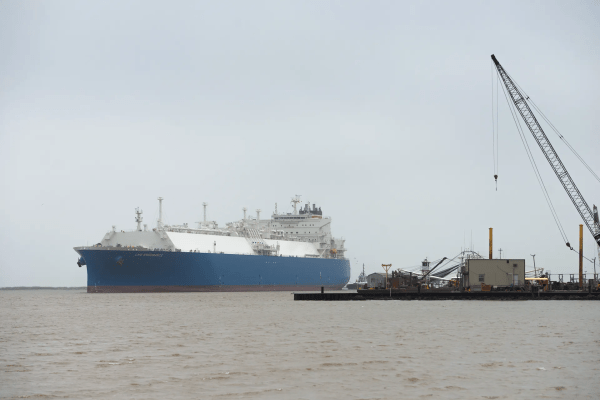
In November 2023, Oregon’s U.S. Senator Jeff Merkeley, along with more than 60 congressional colleagues, asked the U.S. Department of Energy to reconsider liquified natural gas (LNG) policies because those do not “fully or accurately consider how these exports impact the climate, environmental justice, or domestic energy prices.”
The lawmakers noted a new polling report finding voters are in strong support of limiting natural gas exports. The survey found these objections to LNG exports:
- LNG exports result in higher domestic energy prices.
- LNG export terminals pollute communities where they are located.
- LNG export facilities deepen dependence on fossil fuels and delay transitions to clean energy sources.
- A single methane gas export facility may result in climate damaging emissions equivalent to millions of automobiles.
In a July 2023 publication, scientists affiliated with Brown, Harvard, and Duke universities, as well as RMI and NASA, concluded that “natural” gas is as dangerous to the environment as coal if methane leaks are not prevented during upstream and downstream activities.
New York Times reported lead researcher Deborah Gordon saying, “If gas leaks, even a little, it’s as bad as coal. It can’t be considered a good bridge, or substitute.”
Numerous super-emitting gas systems being detected globally underscore the need to accelerate methane emissions detection, accounting, and management practices to certify that gas assets are less emissions intensive than coal.
Evaluating net life-cycle greenhouse gas emissions intensities from gas and coal at varying methane leakage rates
But industry and regulators have had little interest in reporting leak detection publicly. A staff report prepared for the U.S. House of Representatives Committee on Science, Space, and Technology stated that oil and gas companies have internal data showing that “methane emission rates from the sector are likely significantly higher than official data reported to EPA would indicate.”
Committee staff conclude that oil and gas companies are failing to design, equip, and inform their Methane Leak Detection and Repair (LDAR) activities as necessary to achieve rapid and large-scale reductions in methane emissions from their operations. The sector’s approach does not reflect the latest scientific evidence on methane leaks.
Significant methane leaks in BC are reportable under provincial spill reporting regulation. But good luck finding any information about the reports. Annual reports to the Legislature by the Environmental Emergency Program (EEP) are heavy on public relations and generalities but devoid of specific information about spills.Not a single mention of methane in the four EEP reports covering 2019 to 2022.
Author, educator, and climate activist Bill McKibben calls the commitment to LNG the single most dangerous expansion of fossil fuel in the world. He referenced a study by Cornell Professor Robert Howarth that presented a full lifecycle assessment for greenhouse gas emissions from LNG.
For scenarios for LNG that is transported by more modern tankers, the single largest source of emissions in the full lifecycle are those from the production, processing, storage, and transport of the natural gas that comprises the feedstock for LNG. Fugitive emissions of unburned methane are particularly important, but so are the carbon dioxide emissions from the energy intensive processes behind modern shale gas extraction. In all of the scenarios considered, across all types of tankers used to transport LNG, methane emissions exceed emissions of carbon dioxide from the final combustion of LNG. Carbon dioxide emissions other than from this final combustion are significant, but smaller than the carbon dioxide from the final combustion. While some proponents of LNG have argued it has a climate benefit by replacing coal, the analysis presented here disproves this. Across all scenarios considered, total greenhouse gas emissions from LNG are larger than those from coal, ranging from 24% to 274% greater.
The Greenhouse Gas Footprint of Liquefied Natural Gas (LNG) Exported from the United States
Environmental Defence Canada says this country has a serious methane problem because research shows “methane emissions from Canada’s oil and gas sector – due to both venting of methane as part of normal operation, and leaks from equipment – are higher than previously thought.“
Can we trust governments and captured regulators to accurately track methane emissions? Independent observers say no.
The province created BC Oil and Gas Commission to streamline approval processes for the oil and gas industry. The facilitator of fossil fuel production is now known as BC Energy Regulator. Part-time Chair Chris Hayman, an accountant who spent years working in the energy industry, now leads BCER. Fazil Mihlar headed the Commission until 2023. Before government, Mihlar was employed by Postmedia and the Fraser Institute. There he aligned with strict libertarians who reject public oversight of business and industry and prefer self-regulation.
The energy industry heavily influences research into making Canadian oil and gas production less harmful. For example, B.C. Oil and Gas Research and Innovation Society (OGRIS) has membership from the BC Energy Regulator (BCER), Canadian Association of Petroleum Producers (CAPP), and The Explorers and Producers Association of Canada (EPAC). Not exactly independent participants.
Years ago, an Op-Ed in the New York Times by economics writer Timothy B. Lee said this:
…a regulated industry has a far larger stake in regulatory decisions than any other group in society. As a result, regulated companies spend lavishly on lobbyists and lawyers and, over time, turn the regulatory process to their advantage.
New York Times
The energy industry in Western Canada succeeded in that process long ago.
If you find value in posts and dialogue at IN-SIGHTS.CA, please consider financial support. It is a simple process explained HERE.
Categories: Climate Change






1 reply »